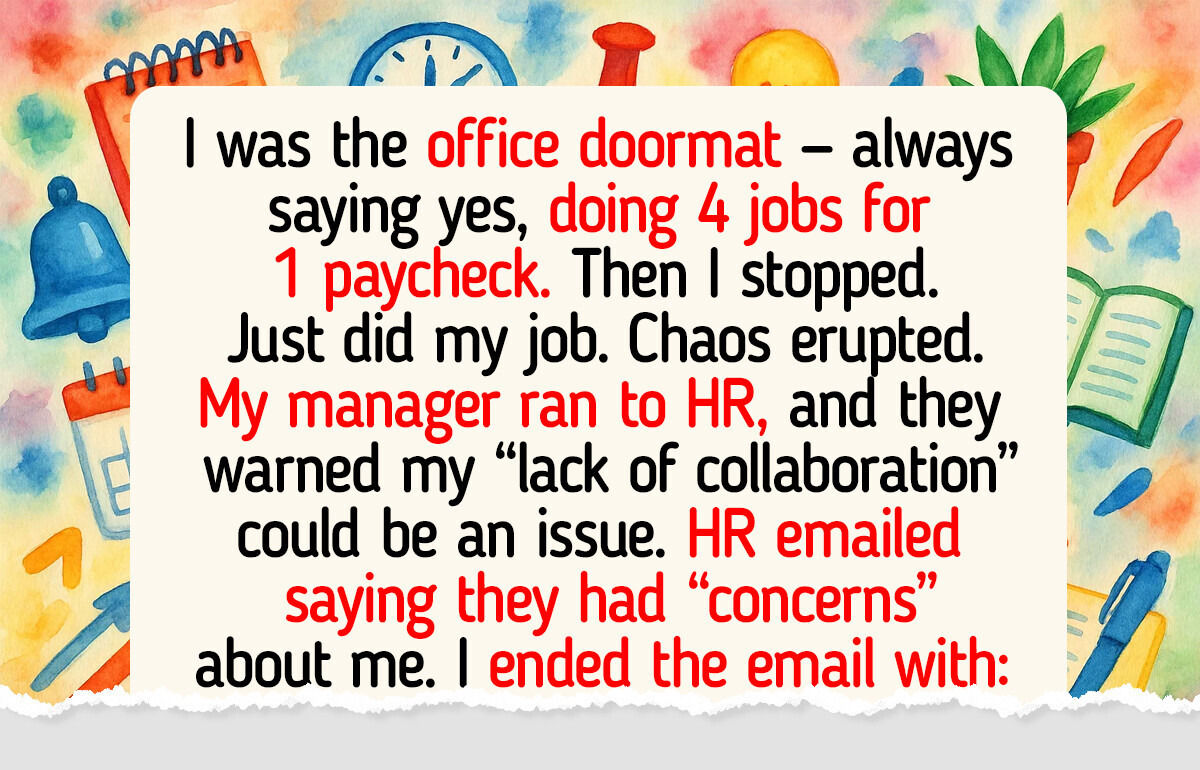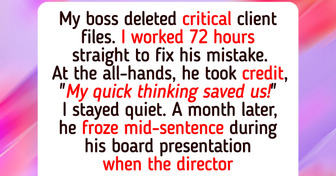Good for you. When I worked at an auto auction, I took on any and every extra task, because I genuinely LIKED THE WORK. Picking up trash ✔️ reparking late sale run throughs ✔️ driving unplanned airport runs for last minute dealers ✔️Sale day employee parking transit driver ✔️ etc... What did I get for all of that? "You can't work so much, we won't pay for overtime". SO, the FULL TIME EMPLOYEES HAD TO WORK OVERTIME INSTEAD. My OT would have cost them less than 1/2 of a full timers REGULAR WEEKLY PAY. Only NOW, they were going to make OT for a task that they didn't want and had imposed on me to do more than once. HR and the BOSSES don't know their asses from their elbows more often than not. Glad you were finally recognized.
I Refused to Do Extra Work, and HR Tried to Punish Me

Workplace drama doesn’t always explode — sometimes it starts with a simple “no.” One of our readers sent us a story about what happened when they quietly decided to stop doing everyone else’s work and start doing only what they were actually paid for. What followed was office chaos, HR confusion, and a reveal that no one, including management, saw coming.
The letter with its own words:

Hi Bright Side!
I used to be the “team player.” Extra tasks? Sure. Last-minute reports? Absolutely.
Covering for coworkers who mysteriously “had dentist appointments” every Friday? Of course.
None of it came with extra pay. Not even a “Thank You”.
Then one day, after staying late again to finish work that wasn’t mine, it hit me: I was basically doing 4 jobs for 1 salary because other people learned I’d never say no.
So I tried an experiment.
For one month, I did only my job. Not less. Not more. No chats after 6 p.m. Just my actual responsibilities, exactly as written in my job description.
Things started collapsing — the tasks I usually “saved” stayed undone. The people I covered for got exposed. My manager suddenly realized half the department depended on me doing invisible labor.
Instead of fixing it, he went to HR. HR sent me a message titled “Concerns About Your Recent Drop in Collaboration.” Their “concern”? I stopped doing everyone else’s work.
They claimed my “team spirit decline” was “creating workflow strain” and hinted it “could impact future employment decisions.”
So I replied with a PDF: my official job description, highlighted.
Then I attached a list of all the extra tasks I’d been quietly doing for months — all outside my role, all unpaid, all undocumented.
I ended the email with: “Please advise which tasks you’d like formally added to my job description, along with the corresponding compensation adjustment.”
Silence for three days. Then upper management stepped in.
Turns out HR didn’t know half the “decline in productivity” complaints were from people who’d been relying on me to do their work. My manager was quietly told to “redistribute responsibilities.”
HR’s follow-up email?
“We appreciate your dedication to working within your defined role.”
H.
Thank-you note
Thank you for sharing your experience with us. Stories like yours remind everyone that setting boundaries isn’t a lack of teamwork — it’s part of staying healthy, fair, and human at work. We appreciate you trusting us with it.
Don’t Stay Quiet When You’re Given Extra Work — Here’s Why It Matters:

“Have you been ‘quietly promoted’?”
The term refers to situations where employees are handed extra responsibilities without receiving a new title or any additional pay. More work without compensation is not a promotion — it’s simply more work.
People worldwide shared a wide range of experiences:
- Being given more duties and later leveraging them to land a better role.
- Speaking up — sometimes receiving credit, sometimes being ignored.
- Viewing the extra tasks as “proving value.”
- Leaving jobs when the added workload became unsustainable.
In leadership and workplace coaching, transparency is a core principle. Clear expectations, written documentation, and honest communication are crucial to creating trust. Yes, emergencies happen. Yes, employees may be temporarily asked to step in. And yes, sometimes budgets don’t allow immediate raises.
But none of this is a reason for anyone to stay silent.
⭐ What managers and leaders can do
When assigning extra work, leaders should:
Set clear expectations about what the added responsibilities involve and how long they will last.
Help identify which existing tasks can be paused or reassigned.
Advocate for appropriate compensation or recognition.

What employees can do
When asked to take on more, employees should:
Request clarity on expectations, the timeframe, and any compensation or future opportunities.
Follow up with an email summarizing the agreement.
Consider how the new responsibilities support long-term career goals and discuss them in regular check-ins.
The key takeaway: Don’t be quiet.
No one should accept extra work without asking questions, setting boundaries, or ensuring the terms are clear.
Helpful insights from the LinkedIn community
Commenters shared practical strategies worth remembering:
For temporary increased workload, request a bonus tied to measurable work.
If it’s a permanent shift (like covering someone who left), request a promotion.
If a raise isn’t possible, explore alternatives: extra PTO, a one-time bonus.
Keep written notes about new tasks to protect yourself.
Track how long added tasks take and compare them with the original job description.
Ask yourself important questions:
• What is the gut reaction to this situation?
• What personal sacrifices will this require?
• What cannot be given up?
• Is there relief at the idea of someone else taking on the responsibilities?
At the end of the day, speaking up isn’t a disruption — it’s how a healthier, fairer workplace begins.
10 True Stories That Prove Kindness Is Quiet — but Stands Strong
Comments
Related Reads
HR Promised Me a Raise Then Gave Me Zero—So I Quietly Got Even

13 Stories Where Kindness Was Literally Built In

12 Moments That Show Kindness Is the Strongest Power We Have

I Refused to Let My Boss Steal Credit for 72 Hours of My Hard Work

10 Times a Painful Truth Turned Into Kindness That Saved a Soul

MIL Invited Us to FIL’s Bday But Expected Me to Pay $100—I Refused

I Gave My Grandkids Their Inheritance at 18 — Their Stepmom Says I Destroyed Her Blended Family

16 Touching Stories That Capture the Chaos and Beauty of Blended Families

15 People Who Went Home for a Quiet Visit but Got a Plot Twist Instead

My Coworkers Excluded Me From Their Group Chat on Purpose—The Real Reason Shattered Me

15 Moments That Prove Kindness Is the Bravest Choice

I Refuse to Return to the Office After My Coworker’s ‘Prank’ Revealed His Darkest Secret
